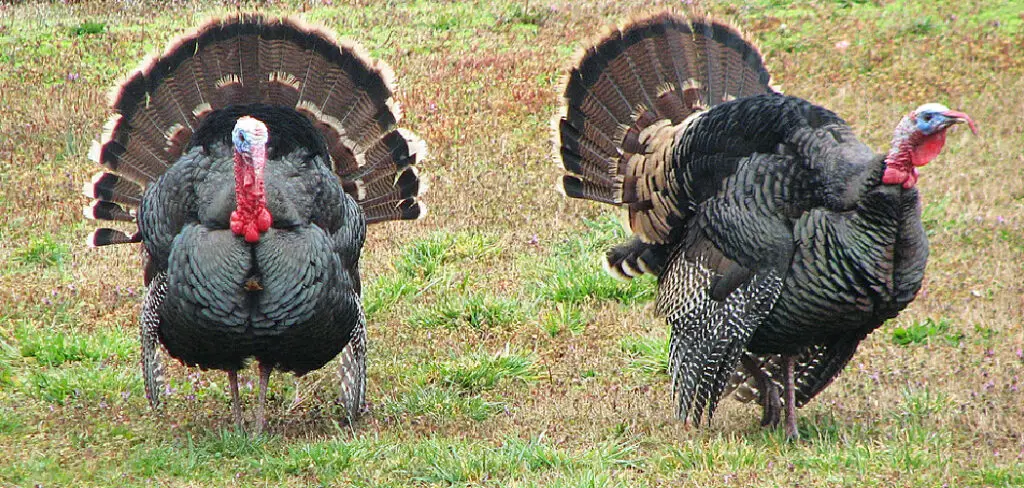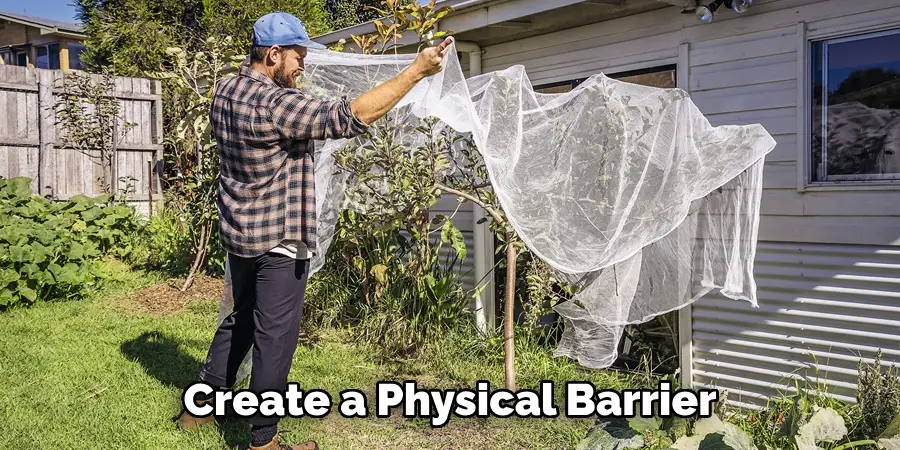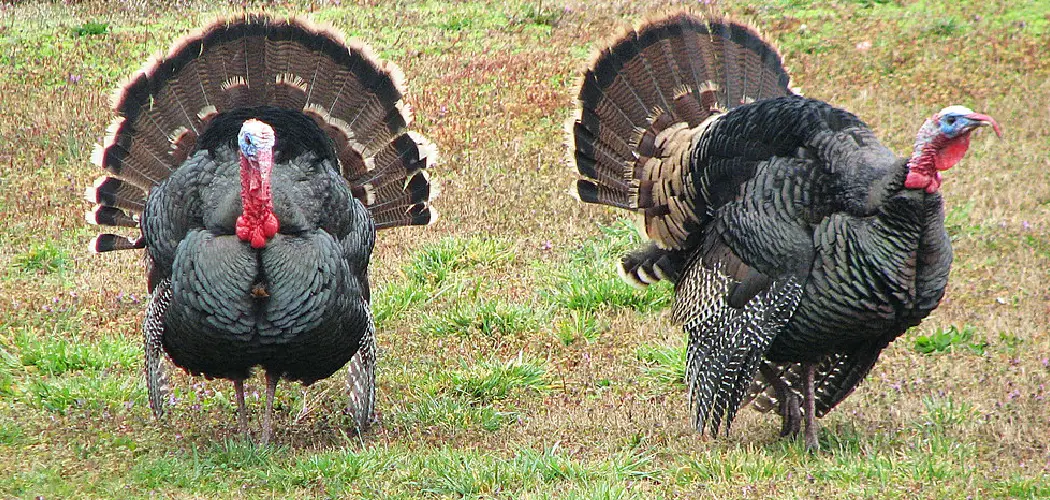Keeping your lawn pristine can be challenging, especially when wild turkeys decide to dig up your yard in search of food. These persistent birds are often attracted to lawns due to the abundance of grubs, insects, and seeds.

Understanding why turkeys target your lawn and implementing effective deterrent strategies can help maintain the beauty and health of your outdoor space. This guide on how to stop turkeys from digging up lawn will provide you with practical solutions to stop turkeys from wreaking havoc on your lawn.
Why Do Turkeys Dig Up Lawns?
Before diving into effective turkey deterrents, it is important to understand why they are digging up your lawn in the first place. Here are some common reasons that might explain their behavior:
Food:
As mentioned earlier, turkeys are attracted to lawns because of the abundance of food sources. They will dig up your yard in search of grubs, insects, and seeds to eat.
Nesting:
During the spring breeding season, female turkeys (also known as hens) will look for a suitable place to build their nest. Lawns with thick grass provide them with a secure and comfortable nesting spot.
Roosting:
Turkeys prefer to roost in trees at night for protection from predators. However, if there are no nearby trees or bushes, they may choose to roost on flat surfaces such as lawns.
7 Step-by-step Methods on How to Stop Turkeys From Digging Up Lawn
Method 1: Use Physical Barriers
One of the most effective ways to prevent turkeys from destroying your lawn is to use physical barriers. These barriers can take various forms, depending on your specific needs and the layout of your yard. Here are some options:
Fencing:
Installing a fence around your lawn can create a physical barrier that prevents turkeys from accessing your yard. Ensure the fence is at least 4 to 5 feet high to prevent them from jumping over it. Chicken wire or mesh fencing works well, as it is both durable and flexible.

Netting:
If a permanent fence is not an option, consider using bird netting to cover specific areas of your lawn. The netting serves as a deterrent by making it difficult for the turkeys to land and dig.
Garden Fabric:
Laying down the garden fabric over sections of your lawn can prevent turkeys from digging up the soil. This method is particularly useful in garden beds or newly seeded areas, where the fabric can also help control weeds.
Temporary Barricades:
For smaller areas or short-term protection, temporary hurdles or barricades can be effective. Items such as stakes with ribbon or string, or even upturned crates, can discourage turkeys from digging.
Using physical barriers is a proactive measure that provides immediate results, helping to keep your lawn intact while you explore additional deterrent methods.
Method 2: Employ Sound and Visual Deterrents
Turkeys are easily spooked by unfamiliar noises or movements. Utilizing sound and visual deterrents can be an excellent way to discourage them from frequenting your lawn. Here are some options to consider:
Ultrasonic Devices:
These devices emit high-frequency sounds that humans cannot hear but are unpleasant for turkeys. Place them around your yard, and they will deter the birds from coming near.
Scarecrows:
This classic method can be quite effective in deterring turkeys as they mistake scarecrows for predators. You can either make one yourself or purchase a ready-made one.

Reflective Objects:
Hanging shiny objects such as CDs or aluminum foil around your yard can create a visual distraction for turkeys, making them think twice before entering.
Method 3: Remove Food Sources
As mentioned earlier, turkeys are attracted to lawns because of the abundance of food sources. By removing these food sources, you can discourage them from digging up your lawn. Here are some ways to do so:
Clean Up Debris:
Remove any fallen leaves or debris that may contain insects and grubs, which are a source of food for turkeys.
Limit Bird Feeders:
Bird feeders not only attract small birds but also larger ones like turkeys. Consider using squirrel-proof bird feeders or placing them in areas inaccessible to turkeys.
Reduce Pest Population:
Use natural methods like diatomaceous earth or beneficial nematodes to control pests in your yard. This will also decrease the number of insects available for turkeys to feed on.
Method 4: Protect Your Garden
If you have a vegetable garden, it can be frustrating to see all your hard work ruined by turkeys digging and pecking at plants. Here are some ways to protect your garden from these birds:
Erect Fences:
Similar to protecting your lawn, using fencing can keep turkeys out of your garden. Make sure the fence is at least 6 feet high and buried at least 2 feet underground for maximum effectiveness.
Use Row Covers:
Row covers, also known as plant blankets or floating row covers, can be placed over your plants to keep turkeys from pecking at them.

Plant Deterrents:
Some plants have a natural defense mechanism against turkeys. Consider planting marigolds, yucca, or prickly shrubs around your garden to deter the birds.
Method 5: Keep Your Lawn Well-Maintained
A well-maintained lawn is less attractive to turkeys as there are fewer food sources and nesting spots available. Here are some ways to keep your lawn tidy:
Mow Regularly:
Keeping your grass short and evenly mowed can help reduce the number of insects in your yard. Turkeys will be less likely to dig if there are fewer food sources available.
Dethatch and Aerate:
Thick thatch layers can harbor insects, making it an ideal food source for turkeys. Dethatch your lawn in the fall or spring and aerate it to improve drainage and reduce compaction.
Water Deeply:
A well-watered lawn is more resistant to digging as the soil is softer and easier for turkeys to access their food.
Method 6: Use Repellents
There are various commercial repellents available on the market designed to keep turkeys away from your lawn. These products emit scents or tastes that are unpleasant for the birds, discouraging them from digging. Some common options include:
Capsaicin:
This spicy ingredient is commonly used in sprays or granules to repel turkeys. It has a strong odor and irritates their taste buds, making them avoid the treated area.
Methyl Anthranilate:
This chemical compound is derived from grape juice and is often used in commercial bird repellents. It creates an unpleasant smell that birds find unappealing.
Predator Urine:
The scent of predator urine can be an excellent deterrent for turkeys as they will believe there is a real threat nearby. You can purchase predator urine or use your own if you have pets.

Method 7: Try Homemade Remedies
If you prefer to use natural methods, there are several homemade remedies you can try to keep turkeys away from your lawn. These include:
Cayenne Pepper:
Sprinkle cayenne pepper around the areas where turkeys tend to dig. The spicy smell will deter them.
Citrus Peels:
Turkeys dislike the scent of citrus, so placing orange or lemon peels around your yard can be an effective deterrent.
Vinegar Spray:
Mix equal parts white vinegar and water in a spray bottle and apply it to areas where turkeys are frequenting. They will avoid the area due to the strong odor.
Following these methods on how to stop turkeys from digging up lawn can help you effectively deter turkeys from digging up your lawn and garden. It may take some trial and error to find the right combination of methods that work for your specific situation, but with patience and persistence, you can successfully protect your outdoor space from these birds. Remember to always use humane methods and never harm or harass turkeys, as they are important members of our ecosystem. Happy gardening!
Frequently Asked Questions
Q: Will These Methods Harm the Turkeys?
A: No, these methods are meant to deter and discourage turkeys from entering your lawn or garden, not harm them. It is essential to use humane methods when dealing with wildlife.
Q: How Long Will it Take for these Methods to Work?
A: The effectiveness of these methods may vary depending on the frequency and determination of the turkeys in your area. Some techniques, such as fences and sprinkling cayenne pepper, can have an immediate effect, while others, like planting deterrents or reducing pest population, may take a few weeks to see results.
Q: Can I Feed Turkeys in my Yard Instead?
A: Feeding wild turkeys is not recommended as it can lead to dependence on humans for food and cause more problems in the long run. It is best to discourage them from entering your yard altogether. Therefore, it is best to follow these methods to keep turkeys away from your lawn and garden.
Conclusion
Keeping turkeys from digging up your lawn and garden can be achieved through a combination of proactive methods and regular maintenance. By understanding the reasons why turkeys are attracted to your yard and implementing steps on how to stop turkeys from digging up lawn such as installing physical barriers, removing food sources, and using repellents, you can create an environment that deters these birds without causing harm.
Remember to be patient and try different techniques to see what works best for your situation. Consistent effort and humane practices will ensure that your lawn remains beautiful and your garden thrives, free from the disruptions caused by turkeys.
About
Outdoor Fixes is a distinguished figure in the world of Diy design, with a decade of expertise creating innovative and sustainable Diy solutions.
His professional focus lies in merging traditional craftsmanship with modern manufacturing techniques,
fostering designs that are both practical and environmentally conscious. As the author of diy,
outdoorfixes delves into the art and science of outdoorfixes-making, inspiring artisans and industry professionals alike.
Education RMIT University
(Melbourne, Australia) Associate Degree in Design (Outdoor Fixes) Focus on sustainable design, industry-driven projects,
and practical craftsmanship. Gained hands-on experience with traditional and digital manufacturing tools, such as CAD and CNC software.
Nottingham Trent University
(United Kingdom) Bachelor’s in outdoorfixes.com and Product Design (Honors) Specialized in product design with a focus on blending creativity with production
techniques. Participated in industry projects, working with companies like John Lewis and Vitsoe to gain real-world insights.
Publications and Impact
In diy, Outdoor Fixes his insights on indoor design processes, materials, and strategies for efficient production.
His writing bridges the gap between artisan knowledge and modern industry needs, making it a must-read for both budding designers and seasoned professionals.

